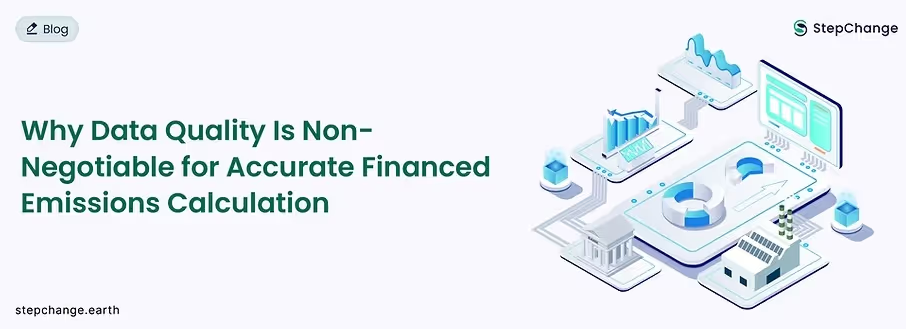
Solutions
Carbon Management
ESG Intelligence
Climate & Nature Risk
Data Registry
Beta
Sector
Get started, schedule a demo or request a free assessment!


As financial institutions race toward net zero commitments, financed emissions—the greenhouse gas emissions linked to lending and investment portfolios—have become the cornerstone of climate accountability. Yet, the credibility of these emissions calculations hinges entirely on data quality. Poor data doesn’t just skew numbers; it undermines decarbonization strategies, triggers regulatory backlash, and erodes stakeholder trust. Here’s why data quality is the bedrock of credible financed emissions reporting.
1. Enabling Science-Based Target Setting and Portfolio Decarbonization
High-quality data is the backbone of credible, science-based target setting for financial institutions. When banks, asset managers, and insurers have accurate, granular data on their financed emissions—the greenhouse gas (GHG) emissions linked to their loans and investments - they can:
Without high-quality data, targets may be set on inaccurate baselines, leading to misleading claims and ineffective climate action.
Example: A bank using PCAF methodology with Score 1 data (verified emissions) can confidently set a 2030 net zero target. One relying on Score 5 proxies risks overpromising and underdelivering.
2. Ensuring Compliance with Regulatory Frameworks
Regulatory bodies and standard setters are increasingly mandating transparent and robust climate disclosures from financial institutions.
Data quality is not just a best practice - it is rapidly becoming a regulatory necessity.
3. Building Stakeholder Trust Through Transparency and Comparability
Investors, clients, civil society, and regulators are demanding greater transparency around the climate impact of financial institutions. Financed emissions reporting that is based on high-quality data:
Conversely, poor data quality can lead to skepticism, damage reputation, and erode stakeholder confidence.
4. Supporting Effective Climate Risk Management and Net Zero Alignment
Managing climate risk and aligning portfolios with net zero pathways requires a deep understanding of where emissions - and therefore risks - are concentrated.
Poor data quality increases uncertainty, making it harder to manage risk and undermining net zero strategies.
5. Mitigating Reputational and Regulatory Risks
a. Reputational risk: Inaccurate or opaque financed emissions reporting can lead to negative media coverage, loss of client trust, and challenges from civil society.
b. Regulatory risk: As climate disclosure requirements tighten, poor data quality can result in regulatory investigations, fines, or forced restatements of disclosures.
c. Greenwashing accusations: Without robust data, institutions risk being accused of greenwashing—making misleading claims about their climate impact or progress.
High-quality data is the best defense against these risks, ensuring that reported financed emissions are credible, defensible, and aligned with best practices.
Data quality isn’t a technicality—it’s the currency of climate credibility. It enables financial institutions to set and track science-based targets, comply with regulatory frameworks, build stakeholder trust, manage climate risk, and avoid reputational and regulatory pitfalls. As the financial sector moves toward portfolio decarbonization and net zero financed emissions, investing in data quality is not optional—it is essential for long-term success and leadership in sustainable finance.
To support financial institutions on their decarbonization journey, StepChange offers the NetZero Navigator - a comprehensive suite of solutions designed to measure, analyze, and reduce financed emissions and manage climate risks with precision and confidence. NetZero Navigator empowers banks, asset managers, and insurers to quantify Scope 1, 2, and 3 emissions across their portfolios using robust, globally recognized methodologies such as the PCAF standard. The platform’s Financed Emissions module enables users to assess carbon intensities, benchmark performance against industry standards, and set science-based targets for portfolio decarbonization. Integrated climate risk and ESG scorecard modules further help institutions identify vulnerabilities, manage transition and physical risks, and optimize ESG metrics in line with evolving regulatory frameworks like TCFD, GRI, IFRS, and GHG Protocol. With scalable, customizable deployment options and alignment to international disclosure standards, NetZero Navigator provides the actionable insights and tools needed to safeguard long-term portfolio value and lead in sustainable finance

.svg)